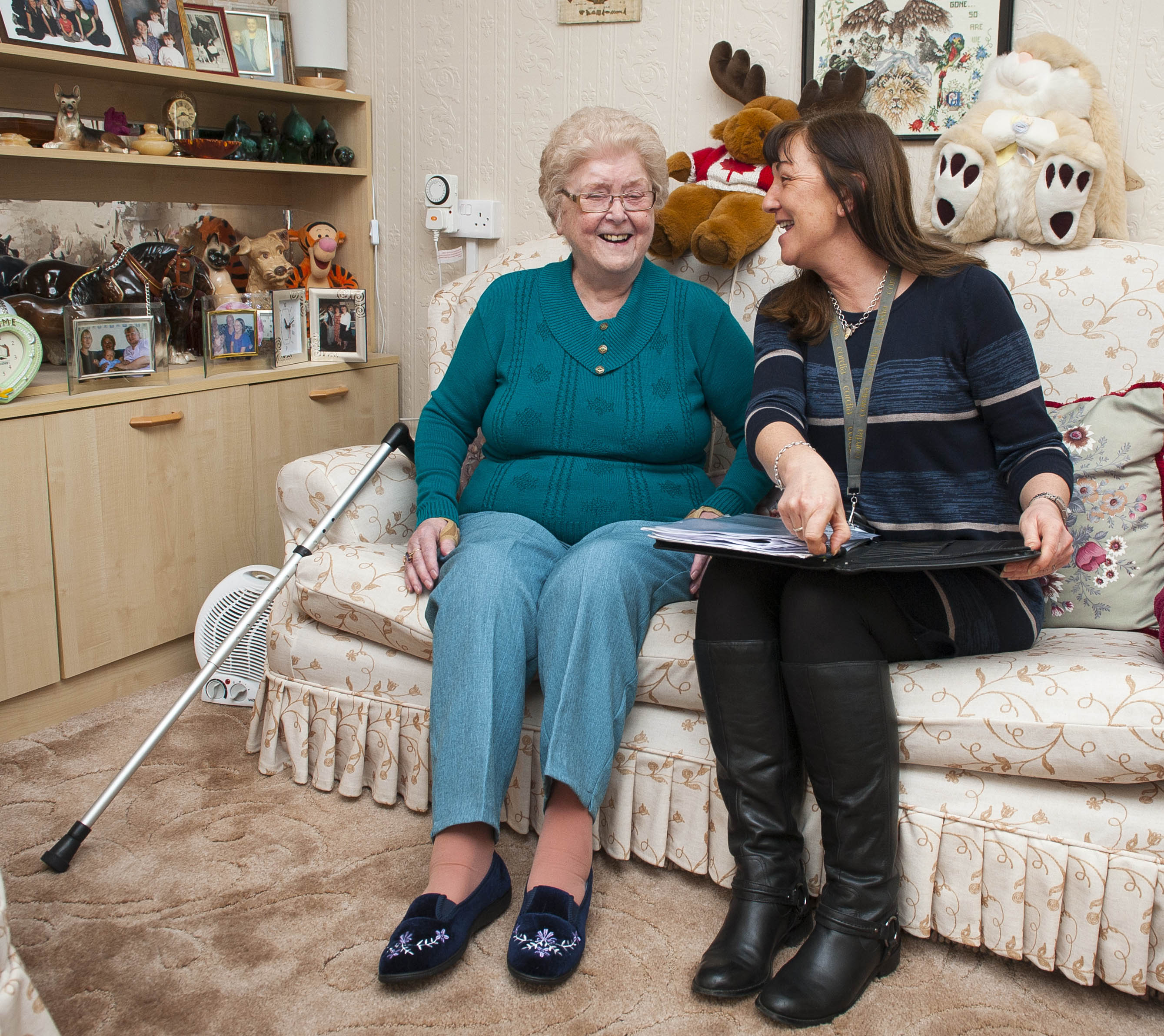Falls prevention
On this page
Falls are a common problem and, as we get older, we can be more likely to fall.
Whilst there are many reasons that make falls more likely as we age, there are also many different things we can do to prevent them.

What help is available?
Community staff in your local area are dedicated to working with people who have fallen or are at risk of falls.
They can offer falls risk screening, support, advice, rehabilitation and specialist further referral when needed.
If you are worried about how you would get help after a fall, consider Telecare. You could get a red button that you simply press to call for help. Find out more about Telecare.

What can I do?
There are many things to look out for which can help to reduce the risk of falls.
Exercise
Exercise is one of the most effective ways to maintain independence and ensure we stay steady on our feet. Anything that challenges our balance and improves muscle strength, particularly in our legs, can help to reduce falls. There are many different exercise activities such as Tai-Chi and dancing, and ordinary day-to-day activities like walking, gardening, housework which are beneficial. You could also consider attending strength and balance classes in your local area (these are sometimes called Otago classes).
Having your eyes checked regularly
This will help to identify any difficulties you may be having with your glasses prescription or other vision problems that may be affecting your balance and co-ordination.
Looking after your feet
Wearing well fitted shoes and slippers can help you to move around safely and comfortably and reduce your risk of falls. Report any problems with your feet to your GP or practice nurse.
Managing your medicines
Certain medicines can make you feel faint or affect your balance. Let your GP know if you ever feel like this after taking medicine or if you are taking several medicines, in case you no longer need them or the dose needs to be changed.
Look after your bones
Keeping active, and eating a well balanced diet that includes plenty of calcium can help keep your bones healthy. Vitamin D is also important.
Check your home for hazards
There are many simple things that can be done to reduce your risk of trips and falls at home - for example, be aware of hazards including poor lighting, loose rugs and trailing cables.
Stay active at home
Strength and balance exercises for older adults.
Get up, get dressed, get moving
End PJ paralysis with the help of The Broons!
Read The Broons - Get Up, Get Dressed, Get Moving leaflet (pdf, February 2024).
Links in the document are to:
- Paths for All - Strength and balance on Health Walks
- Right Decisions - Managing medicines for patients and carers
- Age UK - Promoting Health and Wellbeing in Later Life
- The Chartered Society of Physiotherapy - Public and patient
- NHS inform - Strength and balance exercises
- Falls Assistant- Preventing falls, keeping mobile
- Moving Medicine - Physical activity (pdf, 2021)
See also:

Important: Preventing falls

Information on how to reduce your risk of falling at home and what to do if you have a fall.
Preventing falls at NHS informMore resources
Falls Assistant
Falls Assistant is a falls prevention and self management tool specifically designed and created to help prevent falls, keep people steady on their feet and stay as independent as possible. It enables older people, their carers and family members to assess their own falls risk, and then provides tailored advice that will give them a plan to reduce their future risk of falls and fractures.
Take the Balance Challenge
Age Scotland
Age Scotland provides information and services at a national and local level to enable and support older people when they need it.
Age Scotland has worked with NHS Health Scotland and the National Osteoporosis Society to produce Up and About: Taking positive steps to avoid trips and falls (pdf). It includes information and helpful advice to those most at risk of trips and falls.
More help and advice
- The Silver Line - a helpline for older people.
- Royal Osteoporosis Society - information on the diagnosis, prevention and treatment of osteoporosis and fragility fractures.
- Connecting Carers - information, training and support for unpaid carers.
- Paths for All - local walking groups and activities.
- High Life Highland - including You Time programmes, a range of activities which brings together leisure centres and libraries, encouraging people to get involved, to get active and keep active.
- Home Fire Safety for Older People - home fire safety checks and information provided by Scottish Fire and Rescue Service.
- Royal National Institute for Deaf People (RNID) - supporting people with hearing loss.
- Royal National Institute of Blind People (RNIB) Scotland - supporting people with sight loss.
- Care and Repair Scotland - offers advice and assistance to help elderly and disabled homeowners repair, improve or adapt their homes to allow them to live safely in their community.
- Handyperson Service - Highland Council service for people aged 65 or over (or of any age who have a disability) and require help with small jobs around the house.
